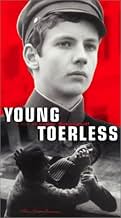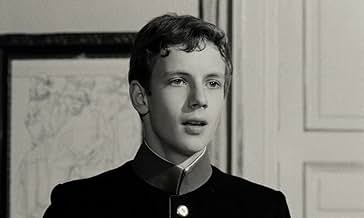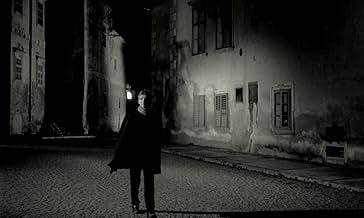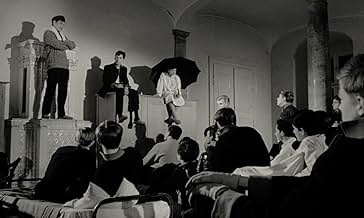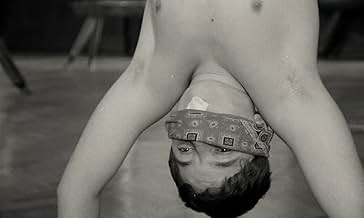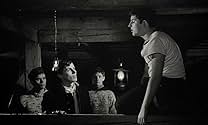IMDb-BEWERTUNG
7,2/10
2812
IHRE BEWERTUNG
Füge eine Handlung in deiner Sprache hinzuIn a boarding school, a student observes in passive disgust as his two friends manipulate, humiliate and torture a fellow student, justifying their every act.In a boarding school, a student observes in passive disgust as his two friends manipulate, humiliate and torture a fellow student, justifying their every act.In a boarding school, a student observes in passive disgust as his two friends manipulate, humiliate and torture a fellow student, justifying their every act.
- Regie
- Drehbuch
- Hauptbesetzung
- Auszeichnungen
- 4 Gewinne & 1 Nominierung insgesamt
Empfohlene Bewertungen
The movie won an award at the Cannes Film Festival when it was first released and signaled the beginning of a German cinematic revival. The book was written in 1906 and is a tedious read, although thankfully a short book. Homosexuality plays a large role in the book but virtually does not exist in the movie. Torless, a horny teenager in an all boys school, eventually has a torrid sexual affair with one of the students. The movie chooses to ignore this, and maybe for good reason as it was released in I believe in 1966. Filmed in black and white, the lack of color contributes to the atmosphere of German austerity that director uses to his advantage. The final speech by Torless is a brilliant defense for the lack of opposition by the middle class to the rise of Hitler. Most of the teenagers in the movie were not aspiring actors but were chosen almost at random for their roles. But considering the time in which it was produced this is a land mark film, especially for German cinema. The movie is much more entertaining than the book and the director,Volker Schlondorff, did a fabulous job and deserves the awards it was given.
Faithfully adapted from author Robert Musil, this study of sadism and masochism among students at an Austro-Hungarian boys prep school is a parable of fascism and its origins. Barbara Steele is radiant and splendid as Bozena the prostitute who awakens the nascent sexual nature of the adolescent students. Lovingly photographed in black and white, YOUNG TORLESS evokes the mood and claustrophobic horror of the dehumanizing military system. Matthew Carriere gives an unblemished and heartfelt performance as an innocent caught behind the barbed wire walls of his very soul and the duty to which he has been placed. A must-see for everyone and an advocacy for pacificism. This was Volker Schloendorff's first film, and by admission one of Barbara Steele's favorite roles.
Young Toerless is some kind of whizz kid,ahead of his time.Played by the phenomenal Matthieu Carrière -who was only 16 at the time;I 'm looking for another actor ,able to play such an intellectual part,at such an early age!-He worries about imaginary(complex) numbers.For him,a square is positive,so the existence of such numbers (the square root of -1 can be i or -i)eludes him.He admits they are useful in geometry(rotations,similitaries)or trigonometry or even to build bridges,but he 's got to admit it without understanding the mathematical concept(You'll find out when you know ten times more in maths,the teacher says)During the movie,he will discover that a lot of things in life have to be admitted without a proof.
The film takes place in an old secondary school,in Austria,at the beginning of the 20th century,while Francis Joseph-whose photographs are pinned everywhere- was still the regnant emperor .This is the end of an era ,1914 is not far away. An iron discipline,students in uniform,the necessary and sufficient condition for the emergence of oppressors and their punching bag.
Two students choose one of their mates as a victim (to make up for their frustrated sexuality,because of a latent homosexuality?Ascene in which they're looking at erotic photographs is telling)And not the first to come!Someone different.Only difference can lead to inferiority. The poor lad stole some stuff,and now his mates can threaten him to reveal the whole thing to the teachers if...
So begin more and more sadistic scenes,culminating with the one at the gymnasium(A symbol : a punch bag is generally a sport outcast) where almost everyone inflicts moral and physical tortures on him.The former is the most humiliating:one of the cowards reads a letter from the unfortunate boy's mother,a widow sometimes unable to make ends meet-all the others are very rich kids-,making a fool of her.
And Toerless?He's primarily a spectator.Not exactly a peeping tom,but someone who uses the whole school,and its particularities,as an experiment behind closed doors.Evil exists as imaginary numbers do,we have to cope with it,even if we cannot understand its source.He will not intervene to help his neighbor,worse,he will shun the sound and the fury,which may infuriate many people who watch this movie.Actually,for Toerless, and for the teachers-who do not seem to be that much angry when they discover the horrible things that happen behind their walls,they are worthy forerunners of Nazis who thought the feeble ,the sick and the "different" one had to be eliminated-,the punch bag story is almost an abstract fact,which they intellectualize to a fault.
Matthieu Carrière has never made the career he deserved."Die jungeToerless" is not exactly an entertaining movie,but if you are looking for something different,this might be your cup of tea.
The film takes place in an old secondary school,in Austria,at the beginning of the 20th century,while Francis Joseph-whose photographs are pinned everywhere- was still the regnant emperor .This is the end of an era ,1914 is not far away. An iron discipline,students in uniform,the necessary and sufficient condition for the emergence of oppressors and their punching bag.
Two students choose one of their mates as a victim (to make up for their frustrated sexuality,because of a latent homosexuality?Ascene in which they're looking at erotic photographs is telling)And not the first to come!Someone different.Only difference can lead to inferiority. The poor lad stole some stuff,and now his mates can threaten him to reveal the whole thing to the teachers if...
So begin more and more sadistic scenes,culminating with the one at the gymnasium(A symbol : a punch bag is generally a sport outcast) where almost everyone inflicts moral and physical tortures on him.The former is the most humiliating:one of the cowards reads a letter from the unfortunate boy's mother,a widow sometimes unable to make ends meet-all the others are very rich kids-,making a fool of her.
And Toerless?He's primarily a spectator.Not exactly a peeping tom,but someone who uses the whole school,and its particularities,as an experiment behind closed doors.Evil exists as imaginary numbers do,we have to cope with it,even if we cannot understand its source.He will not intervene to help his neighbor,worse,he will shun the sound and the fury,which may infuriate many people who watch this movie.Actually,for Toerless, and for the teachers-who do not seem to be that much angry when they discover the horrible things that happen behind their walls,they are worthy forerunners of Nazis who thought the feeble ,the sick and the "different" one had to be eliminated-,the punch bag story is almost an abstract fact,which they intellectualize to a fault.
Matthieu Carrière has never made the career he deserved."Die jungeToerless" is not exactly an entertaining movie,but if you are looking for something different,this might be your cup of tea.
people should not be distracted about the specifics of the plot,or the tangential,secondary themes of cruelty/sexuality..schlondorf has made his metaphor clear and passionate..people in positions of power(due to talent,wealth,titles of authority,physical stregnth,etc)are not entitled to abuse others,no matter what their alleged justification;and people who witness such abuses and do nothing are worse than enablers, they are accomplices..the obvious association is with the Nazis,but this is a universal problem that could be likened to the Spanish inquisition,the salem witch trials,the torture of prisoners during the iraq war,the red scare hearings and countless others..my own feel is that torless is held up as someone who contributes mightily to this particular evil,but fools himself into thinking he's not involved..his final speech was a lame attempt to justify his conduct..the film may not have been entertaining,but it was thought-provoking
Volker Schlondorff has been acclaimed by critics for such films as 'The Tin Drum', 'The Lost Honour of Katherina Blum', and 'Coup de Grace'; all of them films based on fine novels by Gunter Grass, Heinrich Boll and Marguerite Yourcenar respectively, and yet forerunner though he was to the German New Wave Cinema has never been quite given the same acclaim as Wim Wenders, Werner Herzog and Rainer Werner Fassbinder, and I wonder if it is because he films (excellently) from literary sources. His films have a cold look and an enquiring one and 'Young Torless' based on Robert Musil's novel 'The Confusions of Master Young Torless' is one of his best adaptations. The book is as coldly written as the film, and Schlondorff does it justice by using an austere black and white photography, but has as soundtrack Hans Werner Henze's fine if equally emotionless score. Sadly in the current climate of cinema most of these names will seem unknown, lost in the mists of the latter part of the 20th Century. As so many reviewers have given away the plot I will not give in to too many spoilers other than to say it is set on the Austrian-Hungarian border land in an Academy for young male students. In 1906 when it was published there was no such conception of Nazism as we know it, nor was there much in print on sadistic, murderous homosexual torture. Even in 1966 it was brave to put this on film and so unsparingly, and his choice of cast was well chosen. Mathieu Carriere plays the lead role as the 'watcher' and sometimes participator of these perverse pleasures taken by two other students as well as him, and most of the time he looks piously on, studying evil more than opposing it and becomes the worst of all of them as he condones by reason what he sees before him. He is in a way a coward, and unlike the other two admirably played by Bernd Tisch and Fred Diets he hypocritically shows less sexual and sadistic pleasure. I regret that the homosexuality was only obliquely shown, but given the nature of the subject in 1966 it was 'normal' to withdraw the camera for what would have been unacceptable viewing, and only the brutality of the sadism is sickening and fully shown. I give it a 10 for its brilliant attempt to tackle the Musil book and there is a certain failure in the director's approach by him being too cautious, but all the same it succeeds on so many levels that I feel it deserves a 10. It was unique then, and should not be as forgotten as it is now, and was in its way also a forerunner of openly homosexual subject matter. Its political aspects are made too much of as in my opinion it shows the savagery of men hidden away behind polite surfaces; a subject matter as controversial as it is still, and I am thinking of the recent film 'Goat' dealing with hazing in modern Academic schools which has equally been given less distribution than it should have been.
Wusstest du schon
- WissenswertesLuchino Visconti had previously tried to set up a version of " Young Torless " with Romy Schneider starring.
- Zitate
Thomas Törless: Yet another day to tell our grandchildren about.
- VerbindungenFeatured in Film Review: International Films (1968)
Top-Auswahl
Melde dich zum Bewerten an und greife auf die Watchlist für personalisierte Empfehlungen zu.
- How long is Young Törless?Powered by Alexa
Details
- Erscheinungsdatum
- Herkunftsländer
- Sprache
- Auch bekannt als
- Young Törless
- Drehorte
- Eggenberg Palace, Graz, Styria, Österreich(military school)
- Produktionsfirmen
- Weitere beteiligte Unternehmen bei IMDbPro anzeigen
- Laufzeit1 Stunde 27 Minuten
- Farbe
- Sound-Mix
- Seitenverhältnis
- 1.66 : 1
Zu dieser Seite beitragen
Bearbeitung vorschlagen oder fehlenden Inhalt hinzufügen

